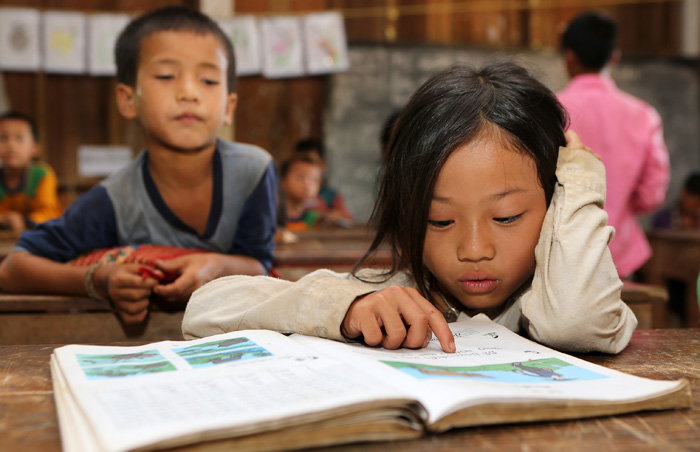
Global Report on Results

Houitoukao primary school (Long District, Luang Namtha Province). Photo: Marcel Giger / Norwegian Church Aid
NCA facilitates inclusion of indigenous knowledge in school curriculums
Geography, gender and ethnicity are key social markers in Laos with non-Lao ethnic children, such as the Akha and Lahu, living in remote areas with limited access to education and other key life skills. This curtails opportunities for social advancement and increases the risk of exposure to violence and human trafficking. These risks are amplified for young girls compared to their male counterparts.
NCA has responded to this situation since 2006 through the Empowerment of Ethnic Minority Children Project with a goal to establish safe, inclusive and quality education for Akha and Lahu children in the remote areas of Luang Namtha Province. NCA’s role in the project has stretched from donor liaison and grants manager, to implementing agency in cooperation with local government authorities, local schools and the communities themselves. Due to limited space for local civil society in Laos, NCA has a proven track record in implementing projects through this model. They took this experience into the project, along with a trusting relationship with local authorities and a decade of working with Akha and Lahu communities. A 2015 evaluation documented impressive results from the pioneering project, including those attributable to NCA’s added value.
Whilst the Lao language remains the sole language for education in Laos, a part of the curriculum is dedicated to indigenous knowledge. The challenge has been the local education authorities’ capacity to fill this with content and in turn make attending school for attractive for the local indigenous children. This challenge has been addressed through the NCA project. In 2015 there were 92 Indigenous Knowledge (IK) teachers working in the target schools, 35 of which are female. These are older community members who have knowledge in areas such as traditional medicine, weaving and crafts. NCA has provided these teachers with a platform to share their skills and knowledge through their role in the schools and through linking them to other IK teachers and local authorities. This has meant they are increasingly recognised and appreciated by the younger generations and local government authorities - the majority of which belong to the majority ethnic Lao population.
Participatory planning approaches used by NCA in the project have also shed light on unused strengths in IK of the community and has meant that community members have been empowered to exchange their views and lead the planning process for the third phase of the project. Teachers and principals also have better knowledge of IK and are trained in management and multi-grade teaching. Whilst there were few schools in the project areas a decade ago, the mountainous project area is now populated with 28 primary schools, two secondary schools and nine pre-schools. As NCA phases out its programme in Laos, it has committed to ensuring the continuation of these results through supporting the project team in establishing a local NGO and providing ongoing project funding.
Back